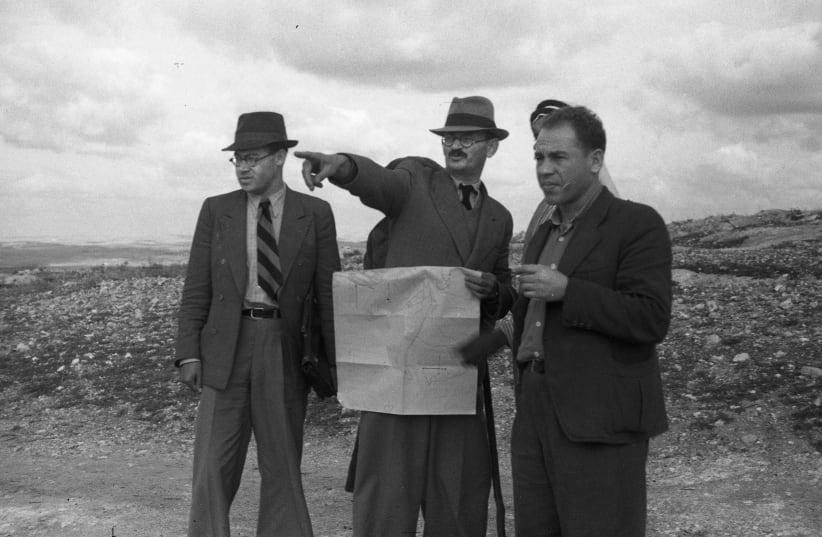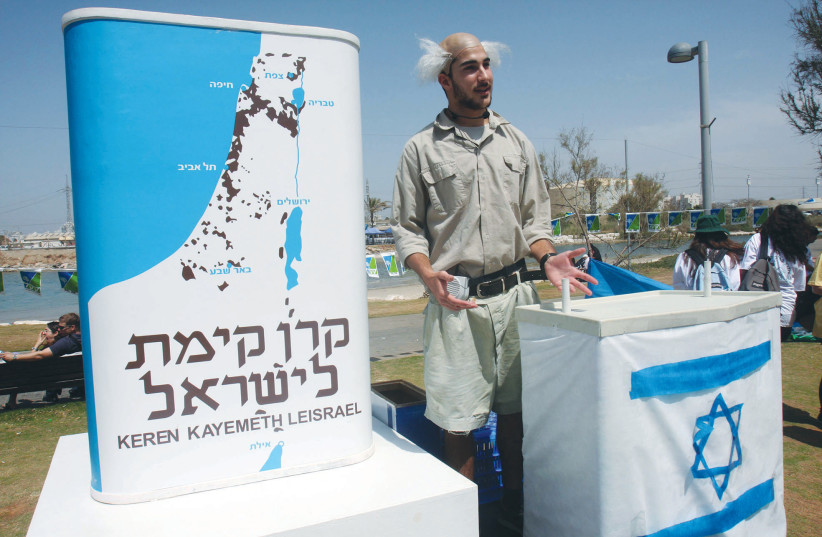When aspiring filmmaker Michal Weits enrolled in the Jerusalem Sam Spiegel Film School in 2007 she never dreamed of becoming a historian. Nor did she expect her first-year assignment to write a film proposal would result in a 14-year odyssey culminating in becoming a finalist for the 2021 Ophir Award (Israel’s Academy Awards) for best full-length documentary.
That documentary, Blue Box, is titled in recognition of the ubiquitous Jewish National Fund blue-and-white metallic pushka found in nearly every Diaspora home for decades dating back to pre-state Israel.
The proposal that began as a loving look at her great-grandfather’s seminal role in the Zionist enterprise resulted in a film that documents both the acquisition of land for a Jewish state and activities that would ensure that displaced Arabs/Palestinians would not have homes to which to return after the 1948 War of Independence.
Weits’s great-grandfather Joseph Weitz, the family patriarch, was intimately involved in the vastly successful JNF campaign to plant forests and acquire land for settlements to “reclaim the Land of Israel,” fulfilling the Zionist vision of establishing a Jewish state in the ancient homeland of the Jewish people.
JNF forests were planned, planted and thrived where Palestinian villages had once stood, by design of “Grandpa Weitz,” according to Weits’s research presented in Blue Box.
As Weits narrates early in the film, she carried tremendous pride in being a descendant of the man whose achievements were marked and celebrated throughout Israel most especially on Tu Bishvat.
Through her research, Weits found original JNF marketing films targeting international Jewish audiences to motivate them to feel an emotional stake in the success of the new Jewish state. The film features speeches by JNF fundraisers who use the concrete uplifting natural symbol of new forests for contributors who, although not planning to move to Israel themselves, felt they must make a special effort to ensure its success as a place refugees from the Holocaust would feel at home.
In crafting her first-year film school proposal, Weits knew that Grandpa Joseph had also left behind a number of handwritten journals, diaries of his activities and thoughts written contemporaneously with his work and responsibilities as director of JNF’s Department of Afforestation and Land Acquisition. Though she had never read the journals, Weits assumed it would be great source material for a documentary on the historic role Joseph Weitz played in the creation of the State of Israel. But it was the discovery of an Internet posting that truly piqued her interest. She found a picture of her great-grandfather alongside founding father David Ben-Gurion, and in the article Weitz was identified as “the father of the transfer” and a “war criminal.”
“I had to check it out, there’s no way I could stay cool, I was angry, and I must find out why expert historians were calling my great-grandfather ‘the architect of transfer,’” referring to the uprooting of the pre-existing Arab-Palestinian inhabitants of pre-state Israel villages, who then became refugees that today number in the millions, forming the core of the aggrieved Palestinian population of refugee camps and the Gaza Strip.
“It was the first time I heard this term, I was completely clueless, I had to go to his diaries, they were kept in my home,” Weits said recently. From the 1948 entries, “I began seeing the word ‘transfer’ repeating itself in the diary,” and thus the passion required for a 14-year journey to make an award-winning documentary film had its inception.
DURING THE research process, Weits discovered the truth that was “never talked about with my family.” Deploying the funds raised internationally by JNF “to plant trees” was her great-grandfather’s responsibility. He was charged by Israel’s young government not only to acquire land but plant forests where thriving Arab/Palestinian villages had stood prior to the War of Independence. For the Arab/Palestinian refugees who found themselves in refugee camps, these JNF activities became known as the “transfer,” thus making Weits’s great-grandfather Joseph Weitz “the father of the transfer.”
As Weits documents in the film, Ben-Gurion led an effort to transfer land from the state to the JNF, ensuring it became private land outside the authority of international law or United Nations resolutions on refugee resettlement. Within Israel this became known as “the million dunam deal,” putting these lands under the authority of the JNF and Weitz to determine their future.
By 2017, Michal Weits had a tight 15-page screenplay and script outline to present as she recruited a team to help turn her project into a feature documentary. Seasoned producer Assaf Amir came onboard and eventually added editors Erez Laufer and Doron Djerassi to the team. Amir became a valued friend and collaborator playing a critical role encouraging Weits to bring her voice to the film.
Over the next two years Weits’s team spent many hours in the editing room taking her work, archival footage, research materials and words from Grandpa Weitz’s diary into a cohesive story. But Amir felt something was missing, an emotional core.
“Shepherding is what I do,” said Amir in a recent interview. “Michal and I discussed everything – all the elements that would appear on the screen – but one of the most important things I thought was the dialogue between Michal and her great-grandfather, we needed Michal to appear in the film and we also needed someone to voice the words in Grandpa Weitz’s diary.”
After numerous auditions they settled on seasoned stage actor Dror Keren to give life to Weitz’s diaries. Film viewers can hear the mixed feelings and deep concern Weitz carried regarding the work JNF and Israel’s leadership charged him to carry out including his predictions of the price Israel would eventually come to pay for displacing the population to fulfill the Zionist dream.
Amir also encouraged Weits to include her family in the film, which meant on-camera interviews with her uncles, cousins and eventually her father, Rami Weits, a well-known sports television broadcaster. Without any preparatory meetings or briefings, Weits invited her family members to one-on-one interviews to capture their genuine instinctual responses to penetrating questions about the heroic family patriarch, Grandpa Joseph.
“I kept my research to myself,” said Weits. “Maybe I was a bit afraid of what my father might say. I really had to do the research and understand everything before I began to talk with my family.”
Despite his on-camera misgivings about participating in his daughter’s project, Rami Weits now says the film is “solid proof my daughter Michal did the right thing, in the right way,” he said recently.
“My daughter’s narration was well done, but she put her hand near the fire,” Rami Weits says. “I am proud of her, I am proud of my grandfather and proud of myself for my role in raising such an amazing daughter.”
Michal Weits said that “in reading the diary I felt I’m reading something very special written by a very special man – Grandpa Joseph – the pride of the family.”
Weits dedicated Blue Box to her one-year-old daughter Lily, recognizing that a new generation has responsibility to understand the past.
“We don’t have the luxury to not ask questions, especially for the next generation.”
“I hope the film starts a discussion and debate among the Jewish people everywhere,” says Weits in summing up her creation.
Blue Box made its Israeli debut at this summer’s DocAviv festival, winning the award for best editing. It made its NYC debut on Sunday at the Other Israel Film Festival – Films Archive.
It has also been recognized at the Vancouver Film Festival, winning the Impact Award. It continues to be shown around Israel, on the YES Documentary streaming channel and at Jewish film festivals worldwide.

